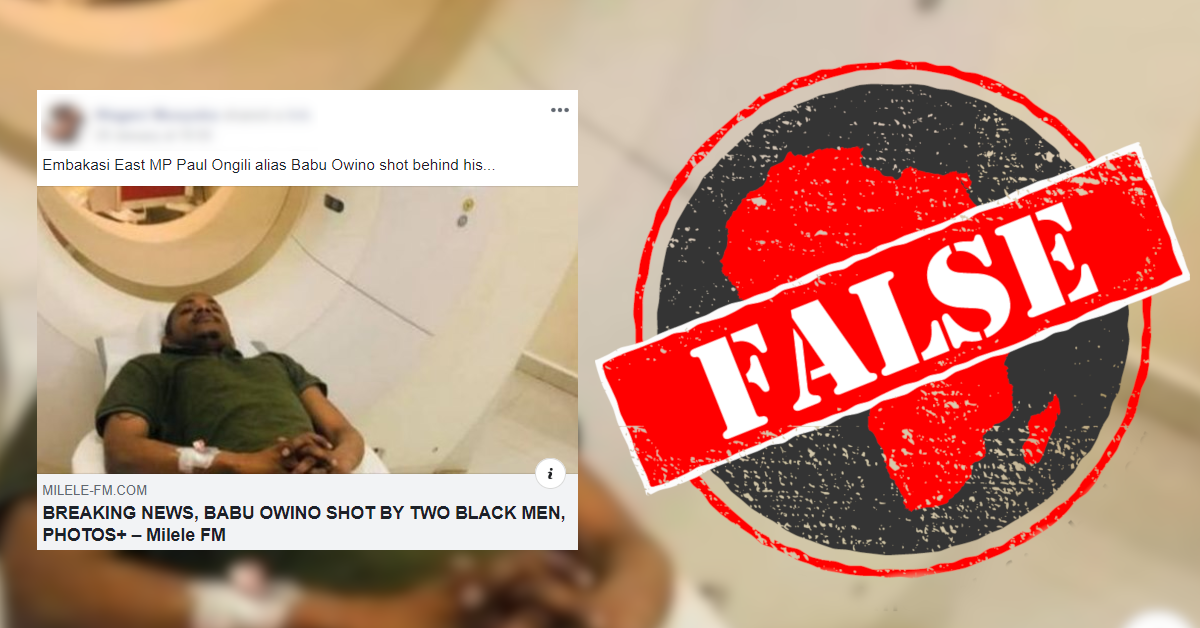Kenyan member of parliament Babu Owino has been charged with attempted murder after allegedly shooting a DJ at a Nairobi nightclub on 16 January 2020.
Four days later the site Milele-fm.com reported that Owino himself had been shot while out on bail.
“BREAKING NEWS, BABU OWINO SHOT BY TWO BLACK MEN,” the headline reads. The story has been widely shared on Facebook.
It says Owino was shot on 27 January, the day he was bailed.
“Babu Owino has since been rushed to Karen Hospital but doctors say his chances of survival are very minimal.”
The article has two photos, one of a man, apparently Owino, about to have a magnetic resonance imaging or MRI procedure. The other photo is definitely of Owino. It was published on the website Nairobi News and shows Owino in court on 17 January.
But was Owino shot just days after shooting someone else?

The article says Owino was arrested for the “alleged killing of DJ Evolve”. But the DJ was shot, not killed, which was why Owino was only charged with attempted murder. The man was injured and, according to news reports, opposed Owino’s bail application in court.
The photo of the man in the MRI machine is of Owino, but almost three months old. A Google reverse image search reveals that the politician posted it on his verified Facebook page on 3 November 2019.
He captioned it: “May God heal me coz I must lead this nation some day.”
And Milele-fm.com is notorious for publishing false information.
It is designed to look as though it’s the website for the popular radio station Milele FM. But on 26 December 2019 a statement on the official Milele FM Facebook page dismissed any connection to Milele-fm.com.
Africa Check has previously debunked two of the site’s false stories, both claiming Kenyan musicians had died. Owino has not been shot, with “minimal” chance of survival. – Grace Gichuhi
Four days later the site Milele-fm.com reported that Owino himself had been shot while out on bail.
“BREAKING NEWS, BABU OWINO SHOT BY TWO BLACK MEN,” the headline reads. The story has been widely shared on Facebook.
It says Owino was shot on 27 January, the day he was bailed.
“Babu Owino has since been rushed to Karen Hospital but doctors say his chances of survival are very minimal.”
The article has two photos, one of a man, apparently Owino, about to have a magnetic resonance imaging or MRI procedure. The other photo is definitely of Owino. It was published on the website Nairobi News and shows Owino in court on 17 January.
But was Owino shot just days after shooting someone else?

Details wrong, photo from 2019
The article says Owino was arrested for the “alleged killing of DJ Evolve”. But the DJ was shot, not killed, which was why Owino was only charged with attempted murder. The man was injured and, according to news reports, opposed Owino’s bail application in court.
The photo of the man in the MRI machine is of Owino, but almost three months old. A Google reverse image search reveals that the politician posted it on his verified Facebook page on 3 November 2019.
He captioned it: “May God heal me coz I must lead this nation some day.”
Hoax website not linked to Milele FM
And Milele-fm.com is notorious for publishing false information.
It is designed to look as though it’s the website for the popular radio station Milele FM. But on 26 December 2019 a statement on the official Milele FM Facebook page dismissed any connection to Milele-fm.com.
Africa Check has previously debunked two of the site’s false stories, both claiming Kenyan musicians had died. Owino has not been shot, with “minimal” chance of survival. – Grace Gichuhi
Republish our content for free
For publishers: what to do if your post is rated false
A fact-checker has rated your Facebook or Instagram post as “false”, “altered”, “partly false” or “missing context”. This could have serious consequences. What do you do?
Click on our guide for the steps you should follow.
Publishers guideAfrica Check teams up with Facebook
Africa Check is a partner in Meta's third-party fact-checking programme to help stop the spread of false information on social media.
The content we rate as “false” will be downgraded on Facebook and Instagram. This means fewer people will see it.
You can also help identify false information on Facebook. This guide explains how.


Add new comment